#which? awards
Explore tagged Tumblr posts
Text
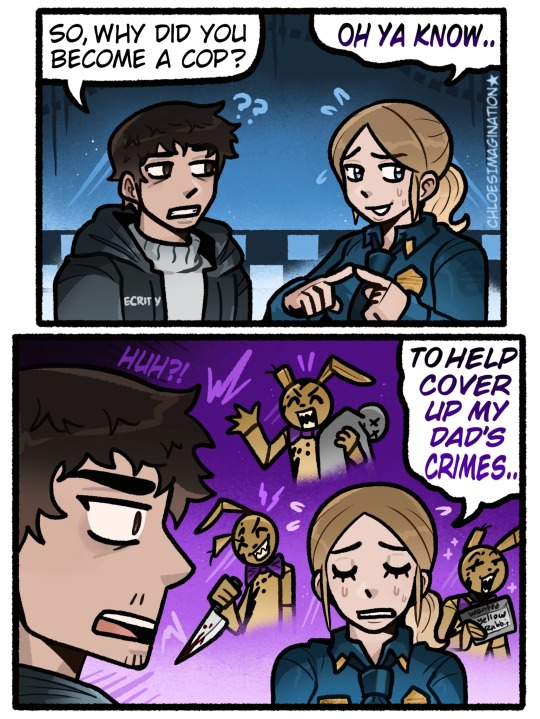
What FNAF movie Vanessa’s REAL job is..
#myart#chloesimagination#comic#fnaf#five nights at freddy's#fnaf fanart#fnaf movie#vanessa afton#vanessa shelly#fnaf vanessa#mike schmidt#william afton#springtrap#listen I didn’t think much about Vanessa being a cop#UNTIL it’s revealed William is her dad in the movie#AND it clicked there thr only reason she is a cop#is to hide her fathers crimes#which is super 9n brand for William ngl#he would use his kids as tools to get himself outta hot water#curious to see if in the next movie if Vanessa is still a cop#or more so moves away from the occupation#now being detached from her fathers grasps#it’ll be interesting to see!!#William winning that worst father award no matter what 😤
4K notes
·
View notes
Text
Right, fuck this. In the spirit of ‘be the change you want to see’, I think we should celebrate Assad Zaman, because fuck knows AMC won’t, so someone has to step up to the plate.
Here’s a Ten Things I Love About Assad’s Performance As Armand list:
The way his voice cracks ever so slightly on the word donated in the Louvre monologue. Also, the entire Louvre monologue.
The hand acting. Thanks to @platoapproved for this gif set which illustrates what I mean.
“Do you find me boring?” Like, obviously, all of 2x05, but that line reading, terrifying and obsessive and heartbreaking and childlike all at once.
The stillness. The way he can be completely still and nevertheless absolutely mesmerising.
Contrasted with gremlin mode in San Francisco when he is anything but still. This post from @hypermania is a great analysis of his physicality and acting choices in this scene.
The micro expressions. The sixteen layers of emotions including three I’ve never even heard of before in some of the reaction shots. The way the directors clearly understand this and hold the camera on his face so that we can watch Assad showing us Armand’s brain at work without a word being said.
His French accent.
The way he sits down on the couch next to Madeleine.
Just how fucking cool he looks on the motorbike in the hunting scene.
Sauntering back into the Dubai apartment in his cunty sunglasses and tragically misplaced confidence.
Feel free to add your own thoughts in notes or reblogs. Let’s appreciate the hell out of him.
#interview with the vampire#assad zaman#armand#ACTING#award winning acting#except not apparently#which reminds me#fuck you amc#assad zaman appreciation#cosmic posts
708 notes
·
View notes
Text
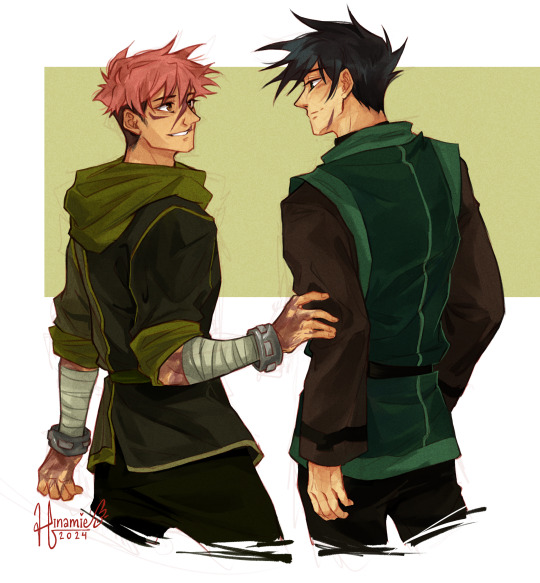
truth is, I used to dream about boys like you
jjk atla!au with @philosophiums
#my art#jujutsu kaisen#jjk#itafushi#fushiguro megumi#itadori yuuji#fanart#jjk fanart#jjk atla!au#atla!au: art#atla!au: illust#lmhs#timelapse#2.5 hours niCE#i mean its still 2am but it could be and has been worse#realized while looking at this tht this au has Vastly increased both my use of and love for the colour green#she will never dethrone red but she definitely gets the award fr most improved#megumi especially looks . sososo good in green which is unsurprising but i am surprised anyway#speaking of megu#i love th timelapse feature so much u get to see me fighting fr my life with yuuji fr like 20 minutes then get megumi first try#there's a reason i needed a ref sheet for yuuji and not megumi. drawing megu is like riding a bike fr me#like minor adjustments r inevitable but his overall face/hair/expression come so easily and i love him all the more for it#anyway#i could have sworn i used adonis fv lyrics for a caption before??? it was so long ago#i guess i must have changed my mind on tht other post bc adonis remains free real estate >:3#PLEASE listen 2 adonis fv........pls i beg.....pls it is so itfs coded.......#hina pleading fr someone anyone to listen to former vandal goes unanswered episode 542346 :(((
2K notes
·
View notes
Text
do yall ever think about bruce/batman!clone danny standing in front of his bathroom mirror after finding out he was a clone and silently tracing his face. The slope of his jaw and point of his chin. The high angle of his cheekbones and the shape of his eyes, the curve of his brow bones and the shape of his nose. The volume of his hair and the way it curls and gets fluffy when it gets too long.
His hair is black the same way a crow's wing is black. His dad's hair is black the same way a black bear's fur is black. His dad's eyes are blue like the ocean is blue. Danny's eyes are blue the same way a glacier is blue.
His dad has a square jaw and straight flat hair, and he tans and gets a face full of freckles when he's out in the sun for too long. Danny burns like a lobster and his face remains untouched. Danny has a sharp jaw and tall cheekbones, and Sam says when he's not smiling there's almost something regal about him. You would never call Jack Fenton "regal" when he's not smiling.
Sam says when he's not smiling he looks scary the same way a stone statue is. Jack Fenton when he's not smiling looks scary the same way that german shepherd staring at you across the street is.
Do you ever think he grew up wondering if he was adopted. Because of course, he has black hair and blue eyes like his dad. But having the same color doesn't make you someone's child.
Or, worse, things he's heard from the other kids and the other parents and even some of his teachers growing up; that he was the product of an affair. And that his dad was just too stupid to notice. And Danny would defend his parents until the day he died, because Jack Fenton wasn't an idiot and Maddie Fenton wasn't a cheater.
But doubt comes in with fickle tongue. his parents swear up and down that he is their child when he asks about either. That Danny just had his grandparents' features, but he was their son and they loved him.
But Danny doesn't look like either of his parents. His mom's eyes are blue like an aquamarine and Jazz's too. And they burn like lobsters in the sun too, but Jazz gets freckles on her face and so does Maddie. And as Danny grows up he doesn't bulk up or get stocky like his dad did, and when he hits puberty he doesn't shoot up like a tree like Jack Fenton did.
He stays small, and they say he's a late bloomer (and he is), or that he just has his mom's height. But he's fast and has good stamina, and some days it feels like he's built entirely different from his family. That the things they went through growing up just didn't apply to him. Jack and Maddie Fenton both had acne and breakouts when they hit puberty, and Jazz inherits it and he's seen the amount of skincare products she keeps on her side of the bathroom.
And then he hits puberty and breaks out maybe once or twice, but his skin stays clear for the most part and the problems and changes his dad went through just don't happen to him.
And the truth is worse than all of the lies.
How horrifying.
#dpxdc#danny fenton is not the ghost king#dp x dc#dp x dc crossover#dpxdc crossover#dpdc#danny fenton is a clone#clone danny fenton#clone danny#thinking about the inherent trauma that comes with growing up as a clone and not knowing and questioning everything about yourself#thinking about the amount of effort and lying that Jack and Maddie would've had to to do if they wanted to pass Danny off as their bio son#the MEDICAL RECORDS#danny's medical history is completely different from theirs. any generational health problems the waynes have would/could be passed down to#danny and he's completely oblivious to it up until the reveal. he'd have no idea about any medical risks until they hit him before that.#so many little things and inconsistencies that would just build and build and build until it finally came to a head and the truth came out#forever and ever and ever fascinated by the underlying horror of being a clone. there's a horror in being cloned but there's also a horror#in BEING a clone. like yes he could've always known from the start and that comes with its own set of issues BUT. just. him not knowing#for the longest time. the lies and deceit and betrayal. you know how adopted kids come out and talk about how they didn't know they were#adopted for the longest time and how traumatizing and betrayed they felt when they're finally told 15-20 years down the line? yeah that#i imagine finding out you're a clone is a lot like that.#i read a book in middle school once abt a girl moving to a new town with her family and getting these horrible nightmares and noticing how#everyone was acting strange around her. one of her nightmares was about the 30yo police officer being a shambling corpse talking to her#and at the end of the book she finds out she's actually the clone of a dead older sister and the police officer was her sister's boyfriend.#and she was in gymnastics but quit and her parents were so disappointed bc the og sister was a champion/award winning gymnastics player#and i never did finish the book but god am i reminded of that.#i love reading the dpxdc clone danny posts and they usually have him brush off being a clone which is literally totally fine but duUUDE#just imagine his own horror over it. its SOOO good
600 notes
·
View notes
Text

Pocky Valen when?
#kamen rider#kamen rider gavv#kamen rider valen#hanto karakida#pocky day#tokusatsu#fanart#artists on tumblr#did this in a bit of a rush bc i just caught up on my job this afternoon#BUT I MADE IT IN TIME for my timezone at least lol#sorry but no i aint creating new forms or gochizos now pls im tired and overworked lkjhgfddfghjk#have the big pocky bat as a treat instead#me @ valen: i would like to award you the highest honor i can bestow — and its my 1st gavv art#and while i dont draw more gavv he'll stay as an honorary member of my kr geats folder and help balancing the non-buffa scale in vain#speaking of which i still wanna draw a shippy thing for 11/11 for my own buccoon needs but it'll probably stay as a sketch#just two more weeks and i'll be free from my overworking routine........... just a lil bit longer......
419 notes
·
View notes
Photo




the greatest trick the devil ever pulled was a 360 boneless half-impossible casper slide, but this one is a pretty close second
#MMM THERE IS NO POINT THRESHOLD AT WHICH YOU ARE AWARDED AN EXTRA LIFE WHICH LEAVES ME UNSURE WHY SO MANY ARE ACTING LIKE THERE IS#call me todd rogers because i'm gonna cheat really obviously but it's going to take decades for any consequences to catch up to me#comics#dinosaur comics#qwantz#webcomics
277 notes
·
View notes
Text

Happy Valentine's Day everyone!
I'll be coloring this later, but enjoy the lineart for now!
#Happy Valentine's Day#Valentine's Day 2025#Hazbin Hotel#radioapple#appleradio#morningradio#hazbin hotel alastor#hazbin hotel lucifer#lucifer morningstar#hazbin hotel fanart#lucifer x alastor#my art#traditional media#traditional art#lineart#I listened to so much pop music while working on this#which is a big deal since I mostly listen to game and movie soundtracks#Hell's Sluttiest Waist Award Winner#the King of Hell ladies and gents
290 notes
·
View notes
Text
MAME Finally Got My Ass!
I don't know how another show is even going to come close to winning the lighting category in my annual Colors Awards because this blurry ass shot in the final of The Boy Next Work alone cemented that the lighting department earned its paycheck.

I have watched both the Thai and Japanese version of Love in the Air, Love Sea, which I was very quiet about, and I'm making my way through Don't Say No, yet none of them have had me cheering for the wildest fucking behavior the way this show and its color-coded crew of crazies did.

So it is with great pleasure that I now proudly state this show has helped me see the MAME light, and it's all due to the lighting. Cue 🎶The Blinding Light of Love🎶

The episode started with Cir having a nightmare of his bright sunshine boyfriend drenched in darkness as he told Cir he didn't love him.
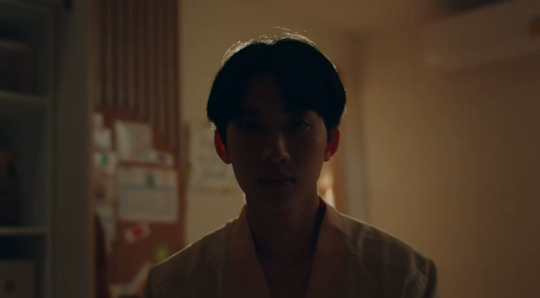
And he woke up in the darkness since Phu has closed him off from his light.
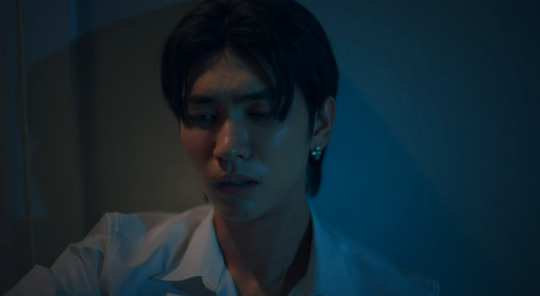
The light only exists over Phu's door, so that's where Cir will remain.
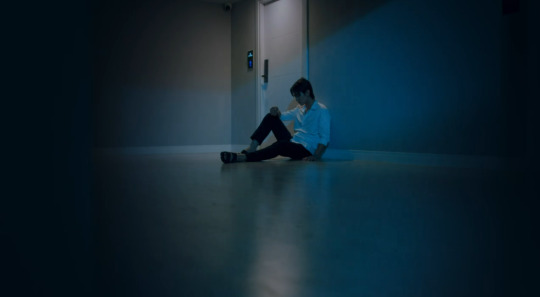
Yet even Phu is crying in the darkness now that he knows Cir has lied to him this entire time.
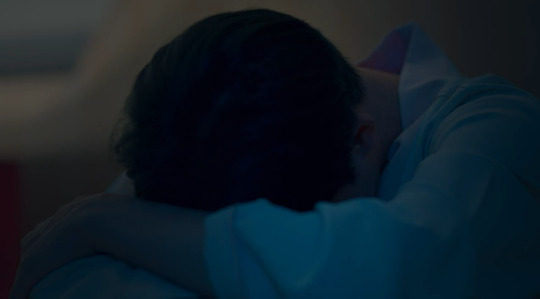
He still has light, but he surrounded by the dark truth that Phu has been stalking him for five years.
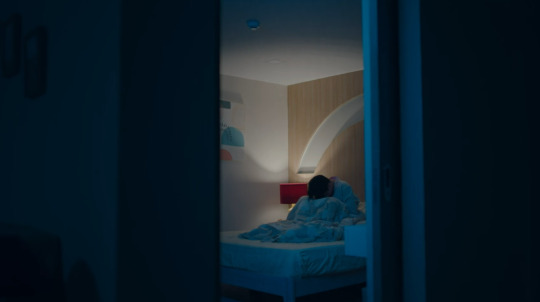
So although the blue is there and a glimpse of green has appeared, Yellow Yal Phu's color is muddied. It's dark. It has been dirtied.
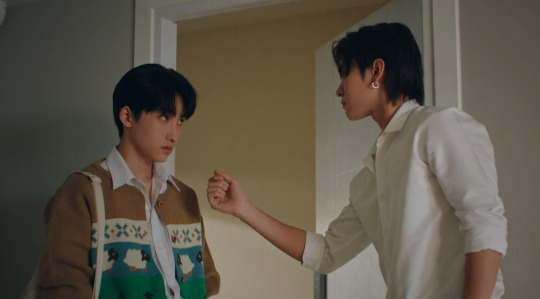
And just when I thought Phu's anger would finally surface in his red cardigan, Cir pulls a Missy Elliot and flips it and reverses it.
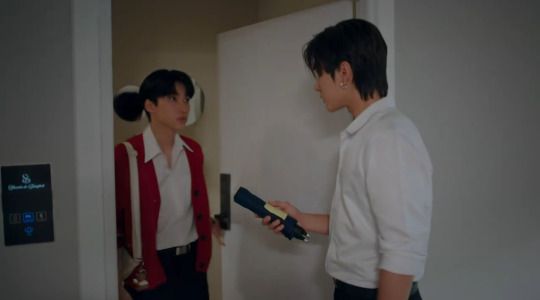
Because this dark Blue Boy starts to reveal all the ways he has sheltered Phu from the literal and figurative storms in his life, like secretly giving Phu a dark blue umbrella to protect him from the rain, and the fact that he kept the yellow sticky note Phu thanked him with.

Cir is no saint, but Phu is slowly starting to realize that his world has only been as bright as it has because Cir has been his guardian this entire time.

And Cir also knows how to pick flowers because the yellow ribbon and yellow flowers are specifically for his sunshine Yellow Yal since tulips represent unconditional love, new beginnings, and hope.
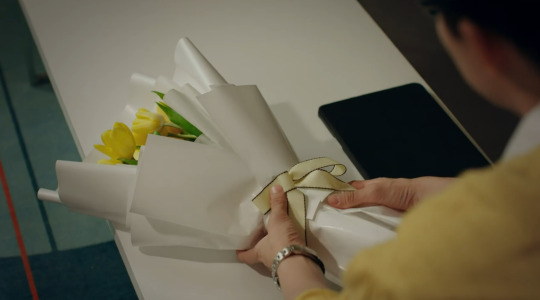
Then, we see Cir the darkest he has been since Phu entered his world as he tearfully explains his reasoning, and normally, I would not forgive a man for saying he will still text and bring gifts even when they are not wanted, but, once again, the lighting department did its damn job.

Because the moment Cir admits that if he had died the day he fought the thieves away from Phu's car, his only regret would have been not getting the chance to really know Phu, the lighting brightened!

So just like Phu, I too would have ran to Cir's apartment, but the lighting department gets me again because the entire apartment is dark and devoid of life since Cir no longer has Phu to brighten his life.

Which means Phu's entire world is upside down. Even when he didn't know Cir was there, Cir was shielding him from a distance, but now, Cir is gone, and nothing is right!
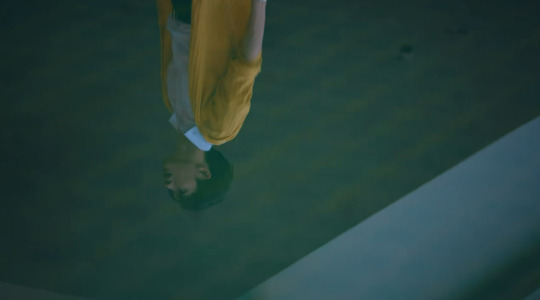
So I was not surprised that Cir returns to that devil known as his mother owner and the woman who pretends to be an angel when it's convenient.

But thankfully Rome, who I'm so sad we didn't get more of, and his exaggerated story push Phu to run after his man with the help of Wim's loyal ass, so my color-coded boys are reunited!
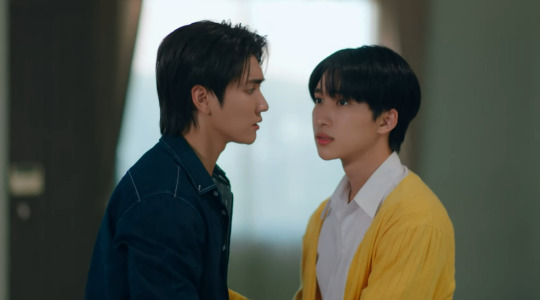
But Director James made sure we know that this devil still stands between them.

Moment of truth — I love her phrasing that the dad abandoned Cir and her. I feel the pain she allowed to fester and mutate into abuse. For two seconds, I saw her as a human who went to the extremes to protect herself, and although I can't forgive her, I do understand her.
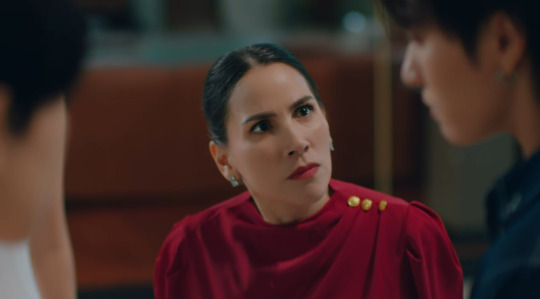
THEN OZONE SHOWS UP TO SACRIFICE HIMSELF AND I'M UNWELL ABOUT IT! Because I knew the only way Yellow Yal Phu and dark Blue Boy Cir could live in the green peace was if this Green Guy gave up his color. He gives up his life for his bother to live. He will step into the darkness, so his brother can step into the light and have his green happiness.

SECOND SEASON FOR OZONE WHEN?!
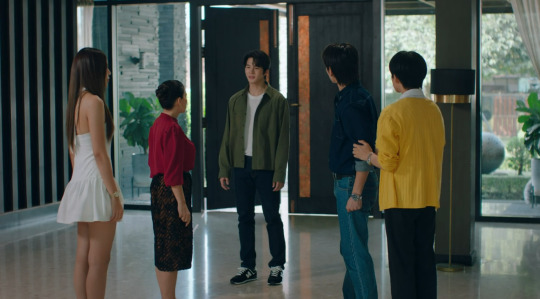
But his sacrifice was not in vain because Phu and Cir immediately step out into the light, sit on a bench in the green park, and confess that they love each other.

And we finally get them blending their colors in a beautifully lit sex scene that bathes them in the warm light with hints of the dark blue which is an amazing depiction of their evolution in comparison to their first sex scene which was darkly lit.

They are in the light, together!

And Wim's willingness to go to the ends of the earth for his crazy ass friend finally pay off because not only does he get a boyfriend who can use his mind-reading abilities to secure him money, but he also really loves him even though it's difficult for him to say because he wears pink around him, and I know pink equals 💕love💕.

So a MAME show won me over because the lighting, the color coding, and this damn blue-colored string phone did their job every single episode and made this show a visual delight to watch every single week.

This Yellow Yal and his dark Blue Boy now get to live in the light surrounded by their green, and I'm thrilled about it!

So just like the pink petals that carry their love into another universe, I wouldn't mind seeing every version of their color-coded love story that MAME wants to offer.

Because, at last I, Petty, love a MAME show.
#the boy next world#boy next world#the colors mean things#color coded boys in love#I loved it!#Now I need a second season for Ozone#because we cannot leave my Green Guy in the darkness#he needs the light just as much as his brother does#and now his brother has his light!#the lighting department earned its paycheck#which is why it's about to get a colors award!#long post#episode ten#finale
179 notes
·
View notes
Text
Book 1 of ASC: "See how xenophobia provides an easy way for radicalization, and how quickly otherwise kind and rational people can get swept away by bigoted echo chambers?"
Book 6 of ASC: "No no you just don't get it. If we do not enforce the arbitrary borders, people won't stay in dangerous situations. If they don't do that, everyone will go where it's safe and they'll bring their icky cultures with them. You don't want our pure clans to get mixed, do you?"
#Bones reads asc#There should be olympic awards for faceplanting this hard#Does every arc start with an actually good writer having a pitch which then gets slowly ruined by the team#What HAPPENEDDDD
191 notes
·
View notes
Text
[WWDitS finale spoilers]
Aside from the obvious – the gross shipbaiting and mocking naive viewers who dared to believe an m/m dynamic could be treated as anything other than the butt of the joke – my biggest issue with the WWDitS finale is that it’s an ending that could have made sense… but at most after s2. Back then, we were still watching a story about characters who didn’t share any particular bonds (except for Nadja/Laszlo) and who were entirely static, unaffected by the things they experienced.
The thing is, the creators themselves realized you can’t build a long-running story on that formula – eventually, the characters had to evolve at least a little, and their relationships had to deepen so viewers would have any reason to root for them. And so Guillermo’s position in the group began to change – first, he earned their minimal respect, then a very solid place, until finally, in season 5, all the other characters had reached a point where they didn’t even hide that they genuinely cared about him a lot. The same happened with Colin, who at first was completely left out by the other housemates but gradually earned an equal spot in the group and developed that stupid yet sweet bond with Laszlo (erasing those memories was, imo, one of the writers’ biggest mistakes). Laszlo showed himself capable of empathy, which he proved again in s5 by helping Guillermo, and even Nadja, who used to completely disregard everyone’s feelings, had several moments in later seasons where she openly cared – at least in her own way – about the others.
And of course, that’s how we got the romantic subtext between Guillermo and Nandor. Over all those seasons – from s3 up until s6 – I was certain it was a classic will they, won’t they dynamic that would end with them getting together. I just couldn’t believe the writers would spend the last 4 seasons making their relationship more equal and showing Nandor’s journey to realizing Guillermo genuinely mattered to him, only to do nothing with it – or worse, regress them back by three seasons. But the late s6 Nandor’s “no homo” attitude has very little in common with the Nandor from seasons 4 and 5, who was openly pining and lusting after Guillermo.
From Guillermo’s perspective, this ending is an absolute tragedy – even the end of the previous episode gave him much more hope. Maybe he’d lost his lifelong dream and still hadn’t found a new purpose, but he had found a family and a place in the world, with a potential chance to build something meaningful with Nandor in the future. I don’t understand why this episode had to undo all of that – to show us that none of his friends really listen to him, that the power dynamic with Nandor will always be uneven, and that ultimately he wasted 16 years, and no one would really care that much if he left. Considering how great Guillermo’s development was, especially in gaining confidence from s4 onward, this ending feels so unfair and insulting to his character.
I feel like the writers’ biggest mistakes have been forcing a return to the status quo after every season. After the breakup in s3, the characters should have stayed apart for at least an episode or two. Colin should have remembered that Laszlo raised him, and they should’ve kept their funny, fucked-up father-son relationship until the end of the show. Guillermo should’ve been a real vampire for at least a full season—or, in my opinion, permanently—because, as it turns out, the writers had absolutely no idea what to do with his character once he lost that goal. Relationships that had evolved shouldn’t be randomly reset by a couple of seasons just because the writers couldn’t be bothered to put in the effort to write anything new for them.
You can’t have your cake and eat it too – if the writers were so dead-set on giving us an ending that says “nothing in these characters’ lives matters, and nothing will ever change,” they should have made the show half as long and spared viewers the trouble of getting invested in character and relationship arcs that ultimately went nowhere.
This is a comedy show that was supposed to make people feel better. After this finale, I feel mocked by the creators for believing that the queer ship they sold me for 4 seasons had a chance of being treated equally to an m/f ship. I’m also sad because the characters were regressed and left stuck in eternal limbo, and generally I feel ridiculed because the writers openly made fun of us for getting emotionally invested in the story they wrote for us.
And maybe the biggest crime of these last few episodes was that they weren’t even remotely funny—so you can’t even say they prioritized comedy over character development, because it failed on that front too.
#wwdits#what we do in the shadows#wwdits spoilers#nandermo#guillermo de la cruz#way too serious thoughts about a show that never took itself seriously#but it really pisses me off that a production which got a couple of GLAAD awards and loved marketing itself as super queer#ends up mocking us so hard ☹#this terrible finale has upset me and I’m honestly so mad about it#because up until s6#this show was in top 5 of my fave comedies ever#I’m afraid such a pointless insulting ending#will forever taint how I see the whole series#(just like HIMYM long time ago)
161 notes
·
View notes
Text




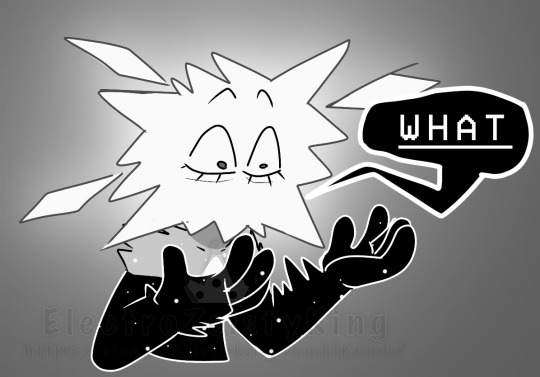
Fun fact about In Rot and Infection: Loop has no idea there’s a mystery sickness going around until after Siffrin loops back from it for the first time. Needless to say they are quite baffled. A little surprised, even.
On the plus side, Loop is definitely immune to it! On account of being a nonbinary star person, of course! So that’s one thing they’ve got going for them.
(Hurray, name reveal for the sickness in IRAI!! It’s called “pourrir disease” because I like how it looks, not because it’s an actual disease. It can also referred to as “pourrir” for short. :3)
#in rot and infection#in rot and infection au#infection au#technically speaking#in stars and time#in stars and time au#isat au#isat loop#isat siffrin#in stars and time siffrin#in stars and time loop#zeisty’s comic stuff#zeisty’s goofs#listen getting to poke fun at this au is a blast so. you get baffled loop from me today#tomorrow? well. every good infection au has stages :)#bonus points to whoever figures out what pourrir means btw :3#march 5th 2025 edit: i think that is unless you're fluent in french to some degree.#then you just win the award for knowing automatically. which means you dont have to guess on that account.
272 notes
·
View notes
Text


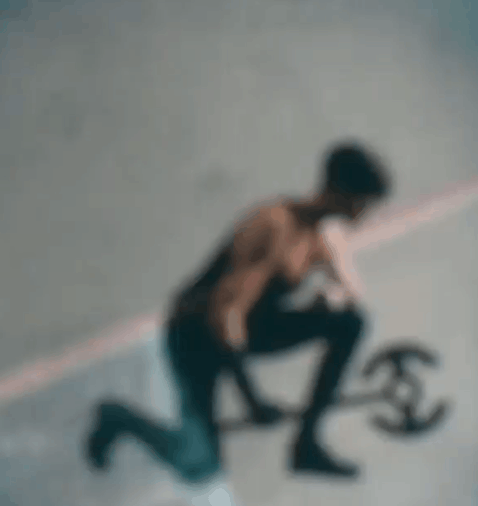

Charlize Theron as Andromache The Scythian The Old Guard (2020)
Character Intro Post, via @Skydance on Instagram, June 15th 2020
TOG Promo Material (Part 3/?)
#I was editing this while Charlize was on stage helping give out the best actress award which I thought was funny#the old guard#andromache the scythian#andy#tog promo material#my stuff#my gifs#the old guard gifs#charlize theron#cast
405 notes
·
View notes
Text
I don't need all shows to be as good as Andor but I do need Andor s2 to be as good as Andor. Do you understand?
#andor#if they only half-arse it or tone down the anti-fascism its dead to me#the rush schedule may indicate theyre hoping for awards noms which is a good sign#but i need it to make me want to crush a fascist's head in with a brick again#it needs to be visceral
117 notes
·
View notes
Text

🌻 can you keep a secret? 🌻
thinking about secret life... and my favorite guy!
also, a comic because i misremembered a phrase from grian in scars 4th secret life episode.. oops!!


i'm fixated on life series again and i have things in store to share!! <:) again im juuuust about wrapping up finals. im gonna rest for a while and then have fun and post all the life series, great god grove, and other stuff i want
and also Colored!! colored stuff. i have a desertduo double life digital painting im working on, and gonna make a print!! i'm probably gonna paint them irl too i have brained rot
#my art#my doods#life series#secret life#life smp#traffic smp#goodtimeswithscar#grian#secret life fanart#desertduo#technically but not romantic here#they're not really romantic to me they're like a secret third thing. anyway#drew this during the game awards btw!! which was a big fat disappointment. all hyper realistic/phot realistic fighting games. BORING
110 notes
·
View notes
Text
What it's like to see [Ja'Marr] be on the cusp of potential history if he gets that triple crown?
I'll make sure he gets it.
#look at him knowing his statsssss#knowing which ones are out of reach for everyone else and which is closest#honestly i think the biggest threat is yards with justin in a kind of close second?? like if justin goes off he might reach it?#which would be a very funny way for all this to end#(i'd be upset still!)#but i do think it's pretty safe at this point!#joe with the soft determined voice 'i'll make sure he gets it' likeeee come on#he WANTED to get ja'marr a super bowl win in his hometown (STILL A POSSIBILITY!)#but if he can't do that. he'll get him this historic award that only 5 other receivers have won in the history of the league!!!#because they are tied together forever!! very intentionally so!#joe burrow#ja'marr chase#joe'marr
128 notes
·
View notes
Text
stuck on the fact that despite the fact that he has dedicated his entire life to the game of exy, the only award kevin day will likely never win is the one named after his mother
#i woke up and this was the first thought i had#like no way the foxes are going to unanimously win a positive spirit award#unless they do which would be WILD and i’d happily be wrong but…#like of course kevin’s favorite team is the one that values the spirit of a team sport#(do you think he gets to give the award away every year or…#bc that would break me#out of nowhere i drastically want to be wrong and for the foxes to somehow win it just so he can get that piece of his mother#aftg#tsc#all for the game#kevin day#the sunshine court#tgr#the golden raven
82 notes
·
View notes